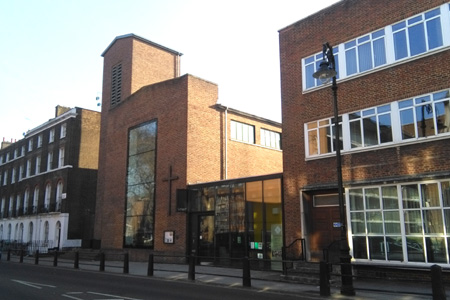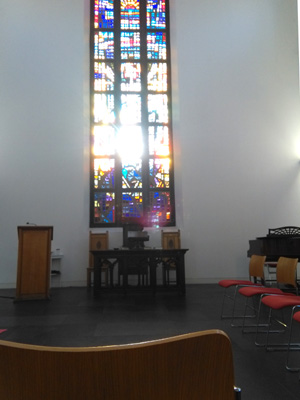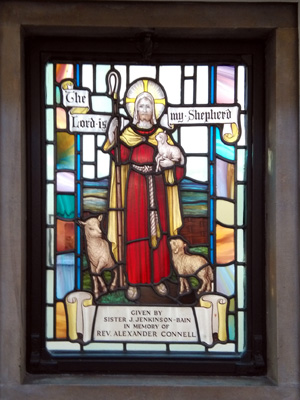| |
 |
 |
 |
| Comment on this report, or find other reports. |
 |
| Our Mystery Worshippers are volunteers who warm church pews for us around the world. If you'd like to become a Mystery Worshipper, start here. |
 |
| Find out how to reproduce this report in your church magazine or website. |
|
|
| 3108: Lumen Church, King's Cross, London |
 |
 |
 |
Mystery Worshipper: Ken T. Poste.
The church: Lumen Church, King's Cross, London.
Denomination: United Reformed Church, North Thames Synod.
The building: It's a most unusual building. From the outside, it looks fairly bland, but it was very recently redesigned and this becomes evident as soon as you walk in. The main meeting area has a fairly small floor area, but an unusually high ceiling, with a stained glass window behind the altar stretching up to the ceiling. At the back of the meeting area is a "quiet space" shaped like a cone, as though crepuscular rays coming through a space in the roof had solidified. The architecture is designed to make use of light, with bright white walls, so the whole space, in spite of its relatively small size, feels quite spacious. The current design was done by Theis and Khan Architects, and was one of the winners of the 2009 RIBA awards.
The church: They began life in 1809 as Gaelic-language chapel and soon moved to Hatton Garden, which was at the time one of the poorest and most crime-ridden areas of London. In 1822, they had their first non-Gaelic speaking minister, Edward Irving. In the 1820s, the church moved to Regent Square and was renamed as the National Scotch Church. Irving was shortly afterwards expelled for encouraging teaching contrary to that of the Church of Scotland and went on to be associated with the founding of the Catholic Apostolic Church. They later became a Free Church, renaming themselves as Regent Square Presbyterian Church. The church building was badly damaged in 1945 by a rocket, after which they met in a lecture hall for 20 years until a new building was put up in its present location. In 1972, the church became part of the United Reformed Church, formed by a merger of most Congregational and Presbyterian churches in England. In the early 21st century, the church changed its name to Lumen, and the building was remodelled. Today they run a cafe that is open weekdays for breakfast, lunch and snacks. In addition to their Sunday service, they put on a Wednesday fellowship and communion service and a Friday night lecture and cultural series. They also support the London Churches Refugee Fund. They let out their rooms for meetings, conferences and workshops, and invite local artists to display their works in their gallery space.
The neighbourhood: The church is located down a quiet side street that's a few minutes walk from the major transport hubs of Kings Cross and St Pancras. So despite being in such a busy area, with people passing through, the church building is somewhat tucked away and unlikely to be found by any but those specifically looking for it or those who are severely lost (in the geographical, not the spiritual, sense). Nearby is also the British Library, which houses, amongst its treasures, the Codex Sinaiticus, one of the oldest books to contain the whole of the New Testament. The King’s Cross is, though, still marked with a reputation for being a red light district, as can be seen if one looks at any of the cards left in the local phoneboxes.
The cast: The service was led by the Revd Geoffrey Roper.
The date & time: Sunday, 22 January 2017, 11.00am.
What was the name of the service?
Sunday Service.
How full was the building?
The chairs were about half full. Including the minister and pianist, I counted 18 people. There was at least one other visitor in the congregation.
Did anyone welcome you personally?
I was greeted on the door by someone who asked if it was my first time visiting the church. As I walked into the main space, a few people smiled and said hello. It was a very warm, but gentle welcome. I was made to feel at home, but not given an interrogation or made to feel awkward.
Was your pew comfortable?
We had individual chairs. They were laid out in a U shape around the auditorium, two rows deep all around. The chairs were fairly comfortable, but nothing special.
How would you describe the pre-service
atmosphere?
It was pretty quiet. With a small congregation, the few conversations that were going on were audible to all.
What were the exact opening words of the
service?
"Good morning and welcome to Lumen."
What books did the congregation use during the
service?
We sang from Hymns of Glory: Songs of Praise. Readings were taken from The Holy Bible, New Revised Standard Version.
What musical instruments were played?
Just a piano.
Did anything distract you?
With no shelves on the back of the chairs, we had to put our books on the floor. It was then that I noticed that the church had underfloor heating, so I was a little perturbed by having to sing from a freshly warmed hymn book.

Was the worship stiff-upper-lip, happy clappy, or
what?
It was fairly straight-laced but not overly formal. There was a minimal use of liturgy. Quoting from their website: "We worship in the Presbyterian and Reformed tradition. Our services are simple, normally comprising a mixture of prayer, psalms and hymns and a weekly sermon." That's pretty much what it was.
Exactly how long was the sermon?
18 minutes.
On a scale of 1-10, how good was the preacher?
8 – The Revd Geoffrey spoke with great clarity. I did wonder if, earlier in his life, he had been a trained actor, as for some reason I imagined him giving a superb reading of the darkly comic British author Roald Dahl's collection of poems known as Dirty Beasts, in which animals undergo a variety of adventures at the expense of horrid, mean people.
In a nutshell, what was the sermon
about?
It was under the title of "Reconciliation: The love of Christ compels us." He started by asking how many places needed reconciliation. Amongst those cited were Northern Ireland (after the recent resignation of the deputy first minister), the United States (after the inauguration of Donald Trump) and Syria (after years of civil war). Also referenced was the Church, with the Reformation being referred to as a "500 year old fissure" that was justified in its origins, but that debates over justification have done more harm than good. The key question in any theological debate must be: "Is this issue sufficiently grave to divide the church over?" If not, then we may need to tolerate differences that we feel do damage, if it is less damaging than division and discord.
Which part of the service was like being in
heaven?
That's difficult to pin down, as it was so incredibly middle-of-the-road. If pressed, I'd say I found the welcome at the start was just right. I was made to feel at home and asked what brought me here, but I wasn't harassed or pressured (that came later, see below).
And which part was like being in... er... the other place?
There was a hymn sung that was new to pretty much everyone, including the pianist. While the singing on the whole wasn't bad for a small church, at this point it descended into uncertain mumbling and no one had a clue whereabouts in the verses we were. It was all a bit awkward and embarrassing.
What happened when you hung around after the service looking lost?
I wandered round looking at some of the small stained glass windows and was soon invited to take a leaflet about the church (from which I pilfered much of the information at the top of this report) and to have a cup of coffee. I spoke to a few members of the congregation, some of whom had very firm views on who should and should not be allowed to have children. I was made aware of the existence of a visitors' book, though after the coffee somebody picked it, plonked it front of me and handed me a pen - making it very clear that not to sign the book would be interpreted as quite rude. The same person then suddenly pulled a load of books out of a bag and tried to sell me some, at which point I made my excuses and negotiated a swift exit.

How would you describe the after-service
coffee?
It was pretty good filter coffee. I think it was fair trade. There were a few biscuits on the table, but I didn't get the chance to try any.
How would you feel about making this church your regular (where 10 = ecstatic, 0 = terminal)?
7 – If I lived in the area, I'd consider it, but I would first look elsewhere for something a bit more up my street in terms of churchmanship.
Did the service make you feel glad to be a
Christian?
The service did. The after church fellowship didn't.
What one thing will you remember about all this in seven days' time?
The pushy members of the congregation trying to get me to sign things and buy things from them. |
|
|
 |
 |
 |
| We rely on voluntary donations to stay online. If you're a regular visitor to Ship of Fools, please consider supporting us. |
 |
 |
 |
| The Mystery Pilgrim |
 |
| One of our most seasoned reporters makes the Camino pilgrimage to Santiago de Compostela in Spain. Read here. |
 |
 |
 |
| London churches |
 |
| Read reports from 70 London churches, visited by a small army of Mystery Worshippers on one single Sunday. Read here. |
| |
|
|
|
|


